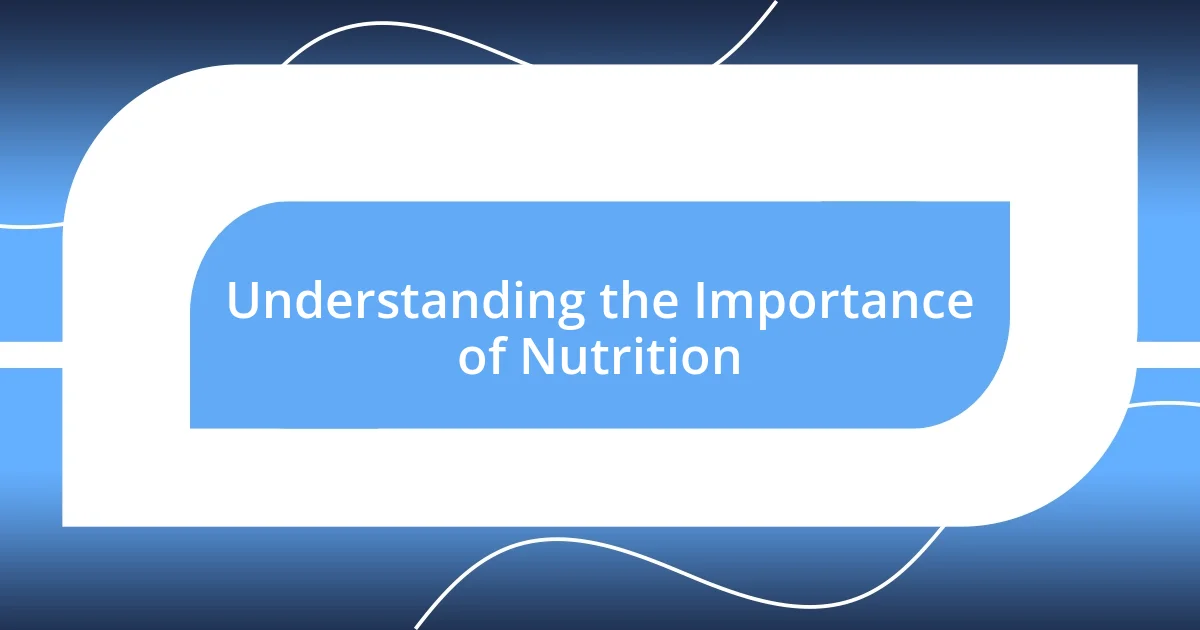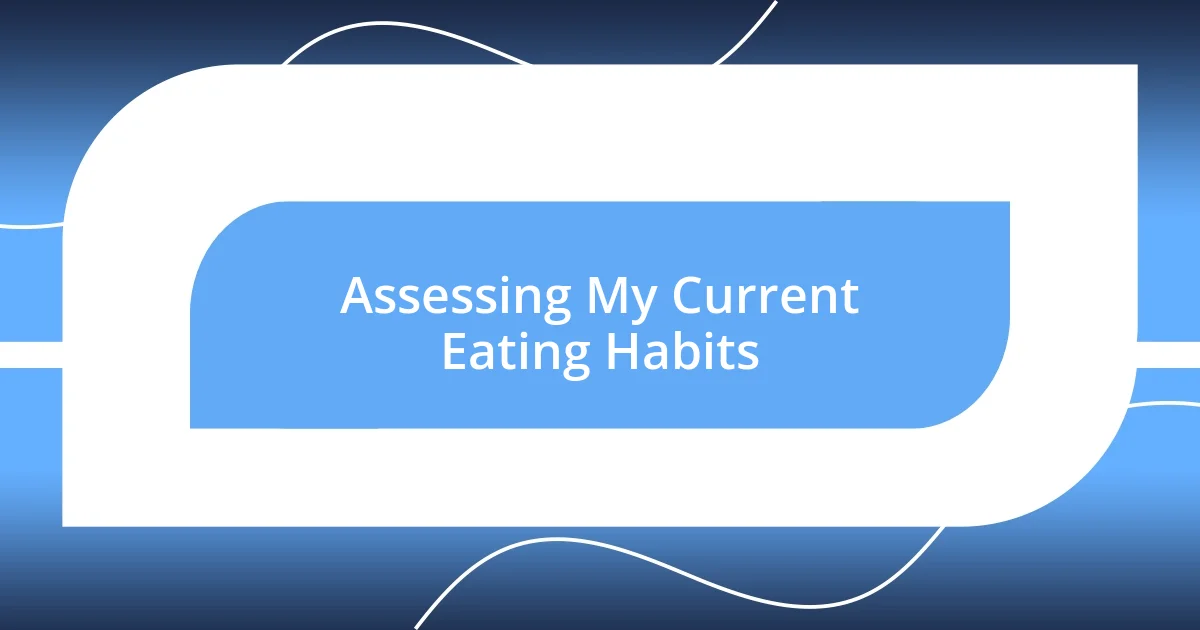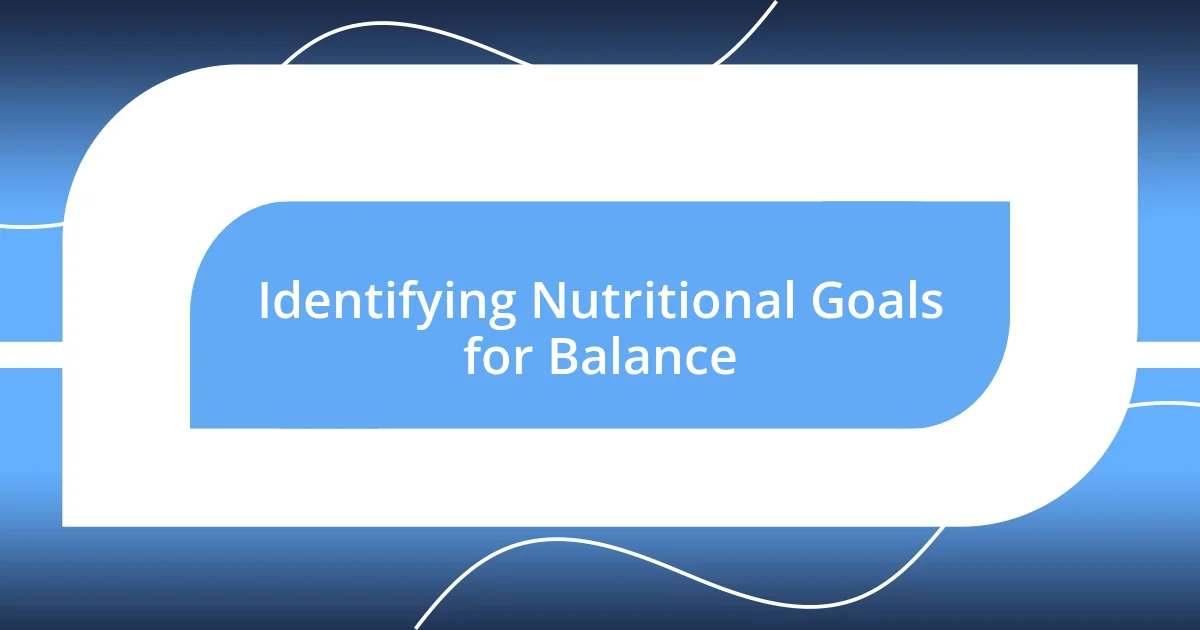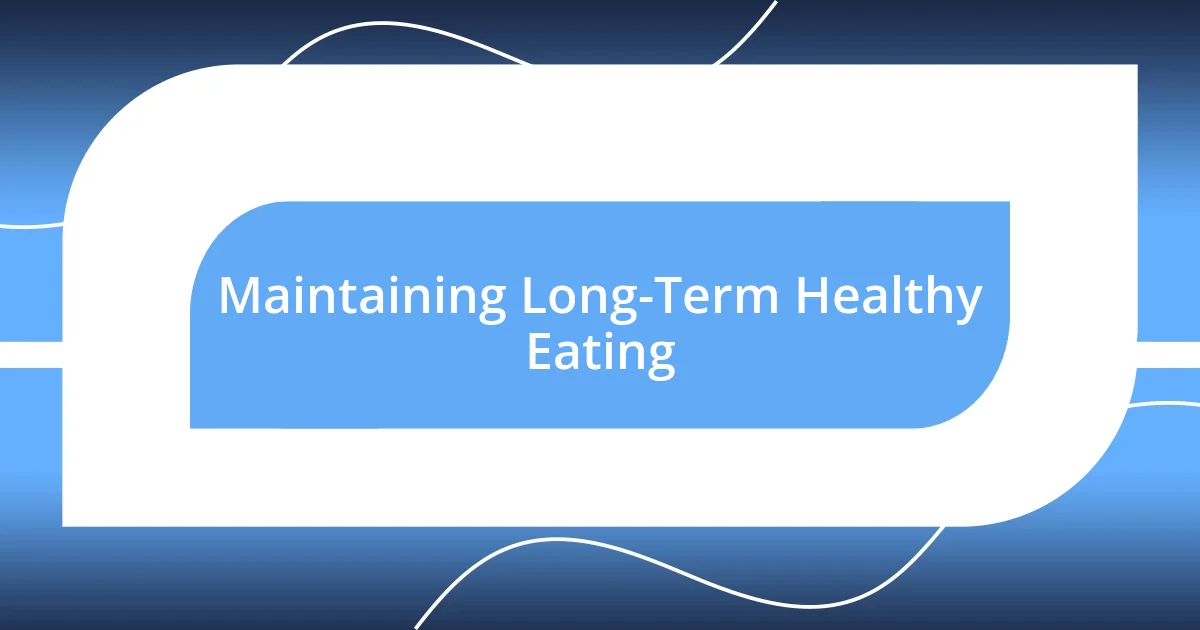Key takeaways:
- Understanding the impact of nutrition on physical health and mood emphasizes the need for a balanced diet, enriching both body and mind.
- Tracking eating habits and making mindful choices can lead to significant improvements in energy levels and overall well-being, highlighting the importance of whole foods over processed ones.
- Creating sustainable eating practices through meal prepping and mindful eating fosters long-term healthy habits without the pressure of rigid rules.

Understanding the Importance of Nutrition
Nutrition is more than just a daily routine—it’s the foundation of our health and well-being. I remember a time when I neglected this aspect of my life. My energy levels plummeted, and my mood swings became unbearable. It made me realize that the fuel we give our bodies shapes not just our physical health but also our mental clarity. Isn’t it fascinating how what we eat can influence our mood and productivity?
Think about it: when was the last time you felt truly energized after a meal? For me, that often came after choosing whole, nutritious foods over processed snacks. I noticed a stark difference; it wasn’t just about feeling full, but about feeling satisfied and vibrant. This awareness made me appreciate the importance of balanced nutrients and made me want to dig deeper into understanding food’s impact on my body.
Nutrition also plays a critical role in preventing chronic diseases. I’ve experienced firsthand how a balanced diet fortified my immunity and improved my resilience against illness. It dawned on me that nourishing my body with the right vitamins and minerals wasn’t merely a health trend; it was a smart investment in my future. Can you envision how altering your diet could also transform your life? It’s quite empowering!

Assessing My Current Eating Habits
Assessing my current eating habits revealed several surprising insights. I often reached for quick fixes—think sugary snacks or ready-made meals—when busy days overwhelmed me. It was a wake-up call when I realized these choices left me feeling drained instead of energetic. Reflecting on this, I understood that my eating habits didn’t just impact my physical health; they also affected my daily mood and productivity.
When I took a closer look, the contrast in my meals was striking. I sometimes neglected fruits and vegetables, opting instead for convenient but low-nutrition foods. One day, I decided to track everything I ate, and it was eye-opening! The number of processed foods dominated my plate. That moment motivated me to shift my focus towards a more balanced approach, incorporating whole foods that nourish both body and soul. There’s something deeply satisfying about munching on a colorful salad or savoring the taste of a homemade dish, isn’t there?
In this journey of assessment, I’ve come to appreciate the power of mindful eating. Instead of munching mindlessly while scrolling on my phone, I’ve started savoring each bite. This simple change not only allowed me to enjoy my food more but also helped me recognize when I was genuinely full. What if you tried this too?
| Eating Habit | Observations |
|---|---|
| Processed Foods | Often chosen for convenience, leading to energy crashes. |
| Whole Foods | Increased feelings of satisfaction and energy when included. |
| Mindful Eating | Savoring meals improved my connection with food. |

Identifying Nutritional Goals for Balance
Identifying nutritional goals can feel like standing at the crossroads of a more balanced life. I remember feeling overwhelmed by the choices and information out there, unsure of where to start. It helped immensely to define clear, manageable goals, which gave me a sense of direction. For instance, aiming to incorporate more plant-based meals each week transformed how I viewed my relationship with food—rather than just seeing it as sustenance, I began to see it as a way to nourish my body holistically.
To craft your nutritional goals, consider the following:
- Set specific targets: Instead of saying “I’ll eat healthier,” aim for “I’ll eat three servings of vegetables daily.”
- Focus on whole foods: Prioritize adding fruits, whole grains, and lean proteins to your meals.
- Listen to your body: Notice how different foods affect your energy and mood.
- Mind the portions: Pay attention to serving sizes to avoid overeating, even with healthy foods.
- Track progress: Keep a simple journal of your meals and how you feel afterward; this can reveal patterns and motivate you.
Creating nutritional goals doesn’t have to be overwhelming; it’s an exciting opportunity to revisit and renew your relationship with food!

Choosing Whole Foods for Meals
Choosing whole foods for meals transformed how I approached my diet. I recall a time when I replaced my usual pasta with whole grain options. The texture was different, but I found it surprisingly satisfying and hearty. What I didn’t expect was how long I felt full afterward. It was such a simple change, yet it brought a noticeable shift in my energy throughout the day.
Navigating the grocery store became an adventure in exploring new ingredients. I started seeking out fresh fruits and vegetables, often picking items I’d never tried before. For example, I came across kohlrabi one day, and it sparked my curiosity. After slicing it up and tossing it in a salad, I was hooked! Incorporating whole foods not only diversified my meals but also made cooking feel like a delightful exploration rather than a chore.
I often ask myself, “What does my body crave?” This question has guided me toward choosing whole foods over processed snacks. When I opted for a homemade chickpea salad instead of grabbing chips, the difference was palpable. Not only did I feel more vibrant, but I also realized how much better my body responded to real ingredients. Have you ever noticed how your mood shifts with what you eat? For me, choosing whole foods became a way to reconnect with my body and nourish it in a way that truly mattered.

Incorporating Variety into My Diet
In my journey to incorporate variety into my diet, I found that trying new foods can be an adventure. I remember the first time I cooked with quinoa; its nutty flavor and fluffy texture surprised me. It led me to discover a world of grains I had previously overlooked, like farro and millet. Each new ingredient added a fresh twist to my meals, making me excited to experiment in the kitchen.
I’ve also learned that variety doesn’t just mean different foods, but also different cooking methods. I once relied heavily on baking and boiling, but then I ventured into steaming and sautéing. The moment I stirred-fried some colorful bell peppers and zucchini with a hint of garlic, I could see and taste the difference. It was a vibrant, flavorful dish that made me realize how altering my approach could awaken my palate.
Reflecting on this, I often ask myself: “What can I add today that I didn’t consider before?” For instance, I recently started including nuts and seeds in my smoothies, introducing a delightful crunch and extra nutrients. This simple addition made my breakfasts not only more appealing but also more satisfying. Have you ever thought about how a small tweak in your meals could completely change your experience? For me, embracing variety has truly transformed my relationship with food, turning each meal into an opportunity for exploration.

Tracking Progress and Adjustments
Tracking my progress along this journey has been both revealing and rewarding. I began by keeping a food journal, noting what I ate and how I felt after each meal. It was an eye-opener! For instance, the day I realized I felt sluggish after overeating at lunch was a turning point for me. I started to recognize patterns that helped me understand what my body needed versus what I craved in the moment. Has something like that ever happened to you?
As I continued my journey, I found that adjustments were crucial. After a couple of weeks, I noticed that my energy levels dipped in the afternoons, leading me to revamp my snack choices. I swapped sugary snacks for a handful of almonds and a piece of fruit. What a difference that made! The sustained energy they provided kept me focused through the day, proving that little changes can yield significant results.
Checking in with myself regularly became a habit. I’d take a moment to reflect each week, asking, “What worked? What didn’t?” This reflective practice not only kept me accountable but also made me feel more in tune with my body. The more I listened, the easier it became to adjust my approach. Have you ever felt like the key to success lies in your ability to adapt? For me, tracking progress and making thoughtful adjustments was the secret sauce to maintaining that balanced diet.

Maintaining Long-Term Healthy Eating
Maintaining long-term healthy eating is all about finding a sustainable rhythm that works for you. I vividly remember a time when I tried to stick to a strict meal plan—it lasted maybe a few weeks before I felt completely deprived. That’s when I realized that it’s not about perfection but rather about making choices that fit my lifestyle and preferences. Have you ever felt that pressure to adhere to rigid rules? For me, that realization was liberating—it’s okay to have flexibility.
To keep my healthy habits alive, I focus on meal prepping. Sundays have become my designated cooking days, and I’ll whip up a few dishes to have on hand throughout the week. Just last week, I made a massive batch of a lentil soup that fed me for days! Knowing I have a nutritious meal ready to go keeps me from reaching for less healthy options when life gets busy. It’s all about creating a safety net that supports my choices, don’t you think?
I’ve found that incorporating mindful eating can play a significant role too. Slowing down and truly savoring my meals has been eye-opening. When I take the time to enjoy each bite, I recognize feelings of fullness sooner and appreciate flavors more deeply. Have you tried this before? It’s amazing how simply pausing during a meal can enhance the experience and reinforce my commitment to a healthier lifestyle.














